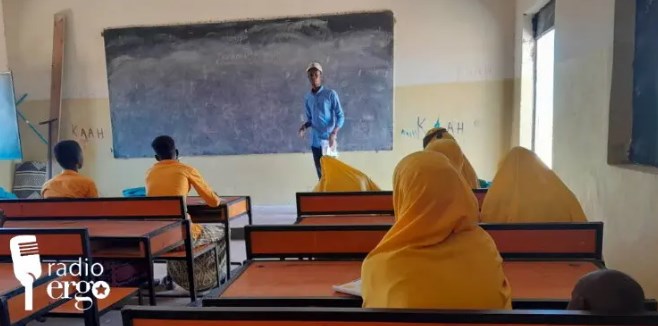
Friday November 17, 2023

Mohamed Dahir Mohamed, 23, teaching in Dhumodle school in Adado/Abdisalaan/Ergo
Bile Ali Osman starting work as a teacher in Hog-dugag school in Adado in July, after being offered a job under a Galmudug state education programme, and immediately enrolled himself in a part-time university course.
He is one of 105 young people appointed to teaching jobs by the Galmudug state administration in 35 schools in Adado.
Bile earns $100 a month and can now pay for his own fees as well as helping his struggling rural family.
“I didn’t have hopes of university. But this is a motivation for me to pay for my education. I was thinking of just getting a job, but today I’ve got the desire to work in education and even foster development in the area,” said Bile.
He has resumed his education after a two year break, studying on Thursday and Fridays. He uses half of his earnings to support his two siblings and parents and although the pay is low he believes it is a good start for him.
Bile’s family were pastoralists, who lost 200 goats to the drought spanning over three years, forcing him to abandon his own education path.
Bile is teaching social studies, technology and science to children and adult learners.
“There’s a big difference between the day the ministry of education brought us here and now. It was hard to find people who could read and write but now in every neighbourhood you can find people who can read and write,” he said.
Bile had been working on construction site, doing eight hour days for a maximum $5 wage. He stopped this labour as soon as he was offered the job as a teacher. He was selected as he was a top student and his family lived in the area.
Also appointed to a teaching job is Mohamed Dahir Mohamed, 23, who finished his secondary school this year. He is now teaching Somali and English to students from grades one to eight in Dhumodle primary and middle school in Adado.
Just like Bile, Mohamed has resumed his own education by starting a degree course.
“I’m now studying at a university and paying for it myself and giving my parents as much as I can. Out of my $100 salary, I pay $25 for my university education and the remaining $75 goes to my family and myself,” he said.
Mohamed buys 12 kilograms each of flour, rice and sugar for his family, who own 100 goats. This supplements their income from livestock husbandry, which has been a struggle as the animals were so weak from the long drought that they could not be sold off.
“I’m very happy, I’ve learned a lot about teaching people and it’s getting easier for me to consider being a teacher for many years,” he said.
The schools that were established by the Galmudug government were intended to give an education to people in remote areas, who could not access schools locally.
The director of education in Adado district, Hussein Ali Sahal, said the new teachers’ pay is low, although they also receive transport allowances. Salaries could be raised in future.
“It would have required higher pay to hire experienced teachers, but for the young teachers they’re satisfied with lower pay. That is why we picked them for teaching primary school education,” he explained.
There are plans to hire more teachers to work in areas where there are no education services.
The programme aims to reduce illiteracy through the provision of free education for children whose parents are mostly pastoralists. Classes are structured for half-day learning, enabling students to participate in livelihood chores such as herding animals for the rest of the day.